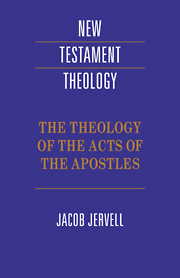3 - The theology of Acts
Published online by Cambridge University Press: 05 June 2012
Summary
God and his People
The Jewish accusations against the church, to which Luke repeatedly refers, have to do with God and the people, Israel. It is alleged that the church has spoken against God and the people (6:11; 21:28; 28:17). These accusations are based upon alleged alterations of the Mosaic law (6:14; 21:21). God is the giver of the law which is a revelation of his will, and to speak against the law, means to speak against God himself and his people. Two groups invoke the same God and claim that they belong to the same people, but one of them denies the other the right to speak about God as their God and Israel as their people. What the church actually is doing, according to the Jewish adversaries, is opposing the God of Israel and writing off the people as the chosen people. That is idolatry. And that is the accusation Luke has to face for his church.
The very centre of Luke's theology is his notion about God as the God of Israel. He designates God as the ‘God of this people, Israel’ (13:17, cf. Luke 1:68; 20:37); ‘the God of the [our] fathers’ (Acts 3:13; 5:30; 7:32; 22:14; 24:14), the ‘fathers’ always being the Israelite forefathers; ‘the God of Abraham, Isaac and Jacob’ (3:13; 7:32); ‘the God of Jacob’ (7:46).
- Type
- Chapter
- Information
- The Theology of the Acts of the Apostles , pp. 18 - 115Publisher: Cambridge University PressPrint publication year: 1996



